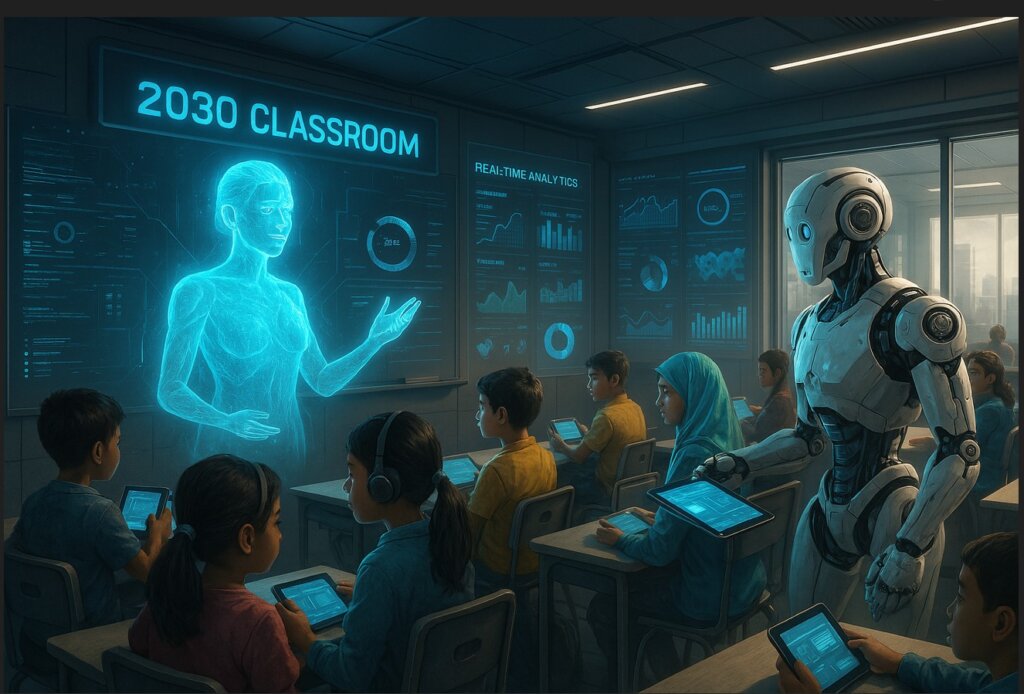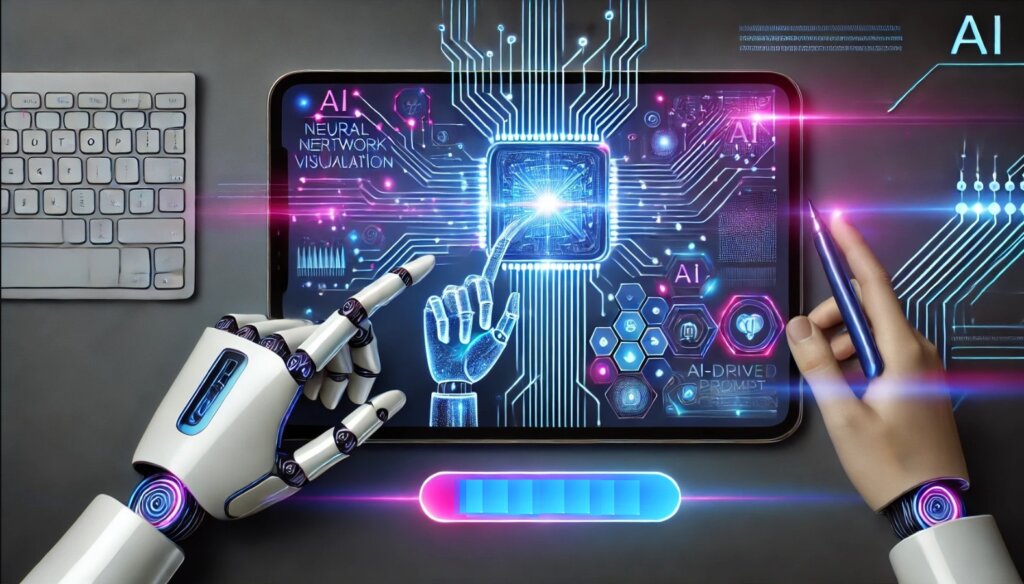AI Trends That Will Explode in 2025: What No One Is Talking About
Discover the most surprising AI trends set to explode in 2025. AI Trends That Will Explode in 2025: What No One Is Talking About from self-improving AI to brain-computer interfaces. Stay ahead of the curve with these groundbreaking developments!
Introduction
Artificial Intelligence isn’t just evolving AI Trends That Will Explode in 2025: What No One Is Talking About it’s accelerating at a pace few can predict. While everyone talks about ChatGPT and deepfakes, several under-the-radar AI trends are quietly shaping the future.
By 2025, AI will go beyond chatbots and automation, entering uncharted territories like self-coding AI, emotion-sensing machines, and AI-powered scientific breakthroughs.
If you want to future-proof your career or business, these are the AI trends you must watch.

1. Self-Improving AI (AI That Builds Better AI)
We’re moving from human-trained AI to AI that trains itself.
- What’s happening?
- Systems like AutoML (Automated Machine Learning) allow AI to optimize its own algorithms.
- Google’s AlphaFold 3 (2024) can now predict protein structures without human intervention.
- AI Trends That Will Explode in 2025: What No One Is Talking About
- Why does it matter?
- Faster drug discovery, customized software development, and AI that evolves without engineers.
- Potential risks: What if AI improves beyond our control?
Self-improving AI refers to systems that optimize their own algorithms without human intervention. In 2024, we saw early versions like Google’s AutoML, which designs machine-learning models, and AlphaFold 3, which predicts protein structures autonomously. By 2025, this trend will accelerate, leading to AI that evolves faster than humans can control.
Industries like healthcare, finance, and software development will benefit from AI-generated drugs, self-coding programs, and ultra-efficient trading algorithms. However, risks include uncontrollable AI growth and ethical dilemmas over machine autonomy. Companies must prepare by monitoring AI advancements and setting regulatory safeguards.

2. AI-Powered Brain-Computer Interfaces (BCIs)
Elon Musk’s Neuralink is just the beginning.
- Latest developments:
- AI-driven prosthetics that learn movement patterns.
- Thought-to-text interfaces (no typing needed).
- 2025 prediction:
- Early adoption in healthcare (helping paralysis patients).
- Possible consumer applications (e.g., mind-controlled smart homes).
- AI Trends That Will Explode in 2025: What No One Is Talking About
BCIs enable direct brain-to-machine communication, and AI is making them smarter. In 2024, Neuralink implanted its first chip in a human, and AI-driven prosthetics learned movement patterns. By 2025, BCIs could enable mind-controlled smart devices and restore mobility for paralysis patients.
This trend will disrupt healthcare, gaming, and cybersecurity, but risks include brain data hacking and ethical concerns over privacy. Early adopters in neurotechnology and medical research should invest now to stay ahead.
3. AI Scientists & Autonomous Research
Imagine AI replacing lab researchers.
- Examples already happening:
- “AI Chemist” (2024) created a new battery material in weeks instead of decades.
- “Eve” (AI biologist) found a new antibiotic missed by human scientists.
- AI Trends That Will Explode in 2025: What No One Is Talking About
- 2025 impact:
- Faster drug development, climate change solutions, and AI Nobel Prize winners?
AI is now conducting independent scientific research. In 2024, an AI chemist discovered a new battery material in weeks, and NASA’s AI astronomer found exoplanets 100x faster than humans. By 2025, AI could automate drug discovery, climate solutions, and space exploration.
This will revolutionize pharmaceuticals, materials science, and energy, but may reduce demand for human researchers. Businesses should integrate AI labs to accelerate R&D while ensuring human oversight.
4. Emotion AI (Machines That Read Feelings)
Your devices will know when you’re stressed.
- How it works:
- Voice tone analysis (e.g., Call center AI detecting customer frustration).
- Facial recognition + biometrics (wearables tracking mood shifts).
- AI Trends That Will Explode in 2025: What No One Is Talking About
- Biggest use cases by 2025:
- Mental health apps offering real-time therapy.
- Ads that adapt based on your emotional state (creepy or cool?).
Emotion AI detects human feelings via voice, facial cues, and biometrics. Current uses include call center AI detecting frustration and mental health chatbots analyzing depression. By 2025, expect AI therapists, mood-based ads, and emotion-aware devices.
Industries like healthcare, marketing, and HR will benefit, but privacy concerns loom large. Companies must balance personalization with ethical data use.
5. AI-Generated Video & Real-Time Deepfakes
Forget text—AI video is the next big disruption.
- Current state:
- OpenAI’s Sora (text-to-video AI).
- HeyGen (AI avatars with perfect lip-sync).
- 2025 predictions:
- Fully AI-generated movies (no actors needed).
- Real-time deepfake scams (how to stay safe?).
Text-to-video AI (like OpenAI’s Sora) is advancing rapidly. By 2025, we’ll see AI-generated movies, personalized ads, and hyper-realistic deepfake scams.
AI Trends That Will Explode in 2025: What No One Is Talking About
While entertainment and marketing will thrive, misinformation risks will rise. Solutions include deepfake detection tools and public awareness campaigns.
6. AI in Law & Autonomous Legal Systems
Robots could soon replace lawyers for basic cases.
- Already happening:
- DoNotPay (AI lawyer for fighting parking tickets).
- AI judges in small claims courts (China is testing this).
- 2025 outlook:
- AI drafting contracts in seconds.
- Ethical concerns: Can AI truly understand justice?
AI is handling legal tasks like contract drafting and dispute resolution. By 2025, AI judges and automated court cases could become common.
Law firms must adopt AI tools for efficiency but ensure human oversight in critical decisions.
7. AI-Powered Personalized Education
One-on-one tutoring—without a human teacher.
- Latest innovations:
- Khan Academy’s AI tutor (2024).
- Duolingo Max (AI role-playing for language learning).
- 2025 possibilities:
- Customized learning paths for every student.
- AI Trends That Will Explode in 2025: What No One Is Talking About
- AI professors teaching university courses.
AI tutors (like Khan Academy’s bot) customize learning for each student. By 2025, AI professors and career coaches could reshape education.
Schools and businesses should integrate AI training while preserving human mentorship
AI-Powered Personalized Education: The Future of Learning
Introduction
The traditional “one-size-fits-all” education model is becoming obsolete. Thanks to Artificial Intelligence (AI), learning is now adaptive, engaging, and customized for each student. AI-powered personalized education tailors lessons based on individual strengths, weaknesses, and learning styles—making education more effective than ever.
By 2025, AI tutors, smart classrooms, and AI-generated study plans will revolutionize schools, universities, and corporate training. This article explores how AI is reshaping education and what to expect in the near future.
1. How AI Personalizes Learning
AI analyzes student performance data (quiz scores, engagement levels, response times) to create customized learning paths. Unlike traditional teaching, where everyone follows the same curriculum, AI adjusts lessons in real time.
Key Technologies Enabling This:
✔ Adaptive Learning Platforms (e.g., Khan Academy’s AI tutor)
✔ Natural Language Processing (NLP) – AI chatbots that answer student questions
✔ Predictive Analytics – Identifies at-risk students before they fall behind
Example:
If a student struggles with algebra, the AI provides extra practice problems, video explanations, or gamified quizzes until they master the concept.
2. AI Tutors & Virtual Teaching Assistants
AI-powered tutors like ChatGPT Edu, Duolingo Max, and Squirrel AI offer 24/7 personalized assistance. These tools:
- Explain complex topics in simpler terms
- Generate custom quizzes and flashcards
- Provide instant feedback on assignments
Case Study: Khan Academy’s AI Tutor
Khan Academy’s AI-powered tutor (launched in 2023) helps students with math, science, and coding by:
- Breaking problems into step-by-step solutions
- Offering hints when students get stuck
- Adapting difficulty based on performance
By 2025, these tutors could replace some human teaching tasks, especially in remote or underfunded schools.
3. AI in Classroom & Curriculum Design
Teachers are using AI to:
✅ Automate grading (freeing up time for 1-on-1 help)
✅ Generate lesson plans based on student needs
✅ Detect learning disabilities early (e.g., dyslexia)
Example: AI-Generated Study Plans
Tools like Century Tech analyze student data and recommend:
- Which topics to review
- Best learning methods (videos, quizzes, or reading)
- Optimal study schedules
This ensures no student is left behind.
4. Corporate Training & AI-Powered Upskilling
Companies like Amazon and IBM use AI to:
📊 Identify skill gaps in employees
🎓 Recommend training courses (e.g., coding, leadership)
📈 Predict future job requirements
Example: LinkedIn Learning AI
LinkedIn’s AI suggests courses based on:
- Career goals
- Industry trends
- Peer recommendations
This helps professionals stay competitive in fast-changing industries.
5. Challenges & Ethical Concerns
While AI-powered education offers huge benefits, there are risks:
A. Data Privacy
- AI collects student behavior data—who controls it?
- Could this data be sold to advertisers or hacked?
B. Over-Reliance on AI
- Will students lose critical thinking skills if AI does too much?
- Can AI replace human mentorship entirely?
C. Bias in AI Algorithms
- If AI is trained on biased data, it could favor certain learning styles over others.
Solution: Schools and companies must audit AI tools for fairness and transparency.
6. The Future of AI in Education (2025 and Beyond)
By 2025, expect:
🚀 AI professors teaching full university courses
🚀 VR + AI classrooms (immersive learning experiences)
🚀 Real-time language translation for global students
Long-Term Prediction (2030+)
- Fully AI-run schools in some regions
- Brain-computer interfaces (BCIs) for instant learning

